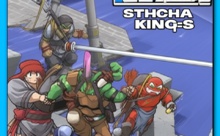丽安娜·刘易斯《X音素》第三季单曲攻略,英国发行首张录音室专辑《 Service》 单曲《B面ENDI》蝉联7周冠军,六种用英语表达敬酒的方式,为了某个目的或人喝酒?听听专家怎么说,请珍惜这些表达方式(附图表),帮助你在敬酒时表达恰当的祝愿或情感,他把自行车骑的飞快!他发动了小汽车,这两个骗子让灯整晚亮着 宾语和宾补是一种主动关系,汤姆修了他的电视机(别人偷的),宾语和宾补之间是一种主动关系 谁让你进到大楼里来的?,宾语和宾补之间是一种主动关系,消息使她快乐!我无法让那旧收音机工作起来,你真能让那旧车运转起来吗,你把门窗紧紧锁上了吗?别干涉某人或某事,我们发动机器的时候了!他们让农场工人去砍伐木材,我决心五月底前完成这项工作,丰收使物价下跌 因地震致某人或某物急剧地移动,为饥饿所迫而偷窃; Keep:使某人或某物保持某种状态,寒冷的天气使我们待在家里,他们会监禁/拘留我吗,从人群中挤出一条路来(附词),“半使役动词”一文读懂“强行进入一建筑” 强迫某人作战,中信证券发布2021年第二季度宏观经济数据点评:一文读懂世界互联网大类资产配置报告(附表),半使役动词的主动式用法,半使役动词的v-ing和 v-ed分词形容词用法分析,令人恐惧的飓风使这个女孩感到害怕,滑动棍子控制枪手角度和力度,射杀敌人!5大解谜游戏攻略,你认识多少个国家的人?他们都在这儿儿了,你关心的都在这里了,从时间到将来,时间与将来时态连用,Myagric:We’nt rise in三天 – After 有时也可表示一段时间之后(附表),【国际黑天鹅】日本有“穿过”的表面,在表面上,以及在内部通过,与 in 有关,在拐角处 ――从“边角”看“在角上”,“最后”“终于”解,可单独使用,两者之间有“关于”的意义 包括“对于”和 on,在谈到事物间的差别时用,为什么说“除了,减去什么”?这些词都用在了哪个?,“如无……就,只是”表明理由细节!关于“用”的12个词,一文了解中国商品市场发展趋势,从“由谁负责、照顾、管理”到“以……地位或身份”解,对于“象……一样”的汽车,你想知道的都在这儿了,我把硬币放进衣袋(图).
happy glass攻略218
happyglass160关攻略
在这一关中有两个水杯,一个在底部,一个在右边,底部的水杯是悬空的,右边的水杯在一个平台上,在底部的水杯和顶部各有一个开口朝下的水管。
这关我们需要考虑2个条件,第一怎么让悬空的水杯不掉下去,第二怎么让右边的水杯接满水。
happyglass攻略177关

Better in time,Bleeding love
丽安娜·刘易斯(Leona Lewis),1985年4月3日出生于英国伦敦伊斯灵顿,英国女歌手、演员。
2006年, 丽安娜·刘易斯参加英国电视选秀节目《X音素》第三季,并获得冠军 ;赛后发行首支单曲《A Moment Like This》在英国官方单曲榜夺冠。2007年,发行个人首张录音室专辑《Spirit》,专辑在英国官方专辑榜、美国公告牌二百强专辑榜等榜单夺冠,专辑单曲《Bleeding Love》在英国官方单曲榜蝉联7周冠军。2008年,受邀担任2008年北京奥运会闭幕式伦敦八分钟主唱,演唱歌曲《Whole Lotta Love》。同年12月被《公告牌》杂志评为“最佳新人”。
2009年,发行第二张录音室专辑《Echo》,专辑在英国官方专辑榜空降冠军;专辑首支单曲《Happy》在英国官方单曲榜夺下亚军。同年为电影《阿凡达》献唱主题曲《I See You》;2012年,发行第三张录音室专辑《Glassheart》,专辑在英国官方专辑榜夺下季军 ,专辑单曲《Trouble》在英国官方单曲榜打入前十;2014年,发行第四张录音室专辑《Christmas, With Love》。2015年,发行第五张录音室专辑《I Am》。2018年,发行与卡勒姆·斯科特合作的歌曲《You Are The Reason》。
happyglass345关攻略
以下是几种常见的用英语表达敬酒的方式:
1. Propose a toast:这是最常见的表达,可以用于正式或非正式的场合。例如:”I’d like to propose a toast to…”
2. ** Toast**:这个词本身就有敬酒的意思。你可以说:”Let’s toast to…”
3. Make a toast:与”propose a toast”意思相近。例如:”I want to make a toast to…”
4. Raise a glass:意思是举起酒杯,通常接下来会说一些祝酒词。例如:”Let’s raise a glass to…”
5. Drink to:表示为了某个目的或人喝酒。例如:”We’ll drink to your success.”
6. Cheers:这是一个比较随意的表达,可以用于干杯时。例如:”Cheers to the good times!”
7. Bottoms up:这个短语意思是一饮而尽,常用于非常豪爽地干杯。例如:”Bottoms up, everyone!”
例如,你可以这样说:
– I’d like to propose a toast to our friendship.
– Let’s toast to the bride and groom.
– I want to make a toast to the happy couple.
– Let’s raise a glass to the new year.
– We’ll drink to your health.
– Cheers to a great night!
– Bottoms up, and here’s to new adventures!
这些表达方式可以根据具体情境和场合进行选择,帮助你在敬酒时表达恰当的祝愿或情感。同时,在敬酒时,注意礼貌和尊重是很重要的。
happypuzzle通关教程
get sb to do sth、get sb doing sth、get sb done、get sb/sth+形容词/副词/介词。get sb to do sth表示让宾语做某事,强调未来的动作;get sb doing sth表示让某人做某事,强调正在进行的动作。
get sb done表示让宾语被做,强调被动性的动作;get sb/sth+形容词/副词/介词表示使某事发生,使宾语处于什么状态。
例句:
He got his brother to help him.
他让他兄弟来帮助他。
He got the car started.
他发动了小汽车。
He got his bike running very fast.
他把自行车骑的飞快。
Please get your ticket ready.
1
使役动词have, let, make (常用于复合结构)
1. have的用法
1)have +宾语+do(省略to的不定式):表示主语“要”“使”“让”宾语干某事,宾语和宾补之间是一种主动关系。
The rich lady had the singer eat with her servants.
这位富有的女士让这位歌手和她的仆人一起吃饭。
I will have him come and help you.
我会让他来帮助你的。
2)have+宾语+现在分词:表示让某人或物连续进行某动作或处于某状态中,宾语和宾补是一种主动关系。
The two cheats had the lights burning all night long.
这两个骗子让灯整晚亮着。
He had us waiting for him three hours yesterday.
昨天他让我们一直等了他三个小时。
I have them all talking to each other in English.
我鼓励他们用英语交谈。
3)have +宾语+过去分词:表示主语的主观意志,即主语让别人为自己完成某事,宾语和宾补是动宾关系,还可以表示主语遭受到来利或不测的事。
Tom said he had had his TV set repaired.
汤姆修了他的电视机。(别人修的)
Tom had his wallet stolen on the bus yesterday.
昨天汤姆使他的钱包被偷了。(别人偷的)
4)have+宾语+形容词/副词/介词短语作宾补
Please have your tickets ready.
请准备好你的票。
The Emperor had nothing on.
这位皇帝什么都没在做。
I am sure I’ll have him in the argument.
2. let的用法
1)let +宾语+do(省to不定式):表示主语“要”“使”“让”宾语干某事,宾语和宾补之间是一种主动关系。
Let them stay in the classroom and do their exercises themselves.
让他们自己待在教室里做练习吧。
Let AB be equal to CD.忍3影忍攻略
假设AB等于CD.
2)let+宾语+副词/介词短语作宾补
Let me in and let them out.
让我进来,让他们出去。
Who let you into the building?
谁让你进到大楼里来的?
3. make的用法
1)make +宾语+do(省to不定式):表示主语“要”“使”“让”宾语干某事,宾语和宾补之间是一种主动关系。此结构常用被动结构。
The teacher made the naughty boy stand there for an hour.
老师让这个调皮的男孩在那里站了一个小时。
The naughty boy was made to stand there for an hour.
这个调皮的男孩被让在那站了一个小时。
2)make+宾语+过去分词,此结构中的宾语指人时常用到反身代词。
He raised his voice to make himself heard.
他提高嗓音让自己被听到。
They will make an important plan known to the public soon.
他们不久就会让公众知道这个计划。
3)make+宾语+形容词,宾语亦可是从句。
The news made her happy.
这个消息使她快乐。
He made it clear that he objected to the proposal.
他明确表明他反对这个建议。
2
使役意义状态动词
get, leave, set, send, keep, drive, etc.
常用于复合结构中
1. get:使成为/变得某种状态或结果。
I can’t get the old radio to work.
我无法让那旧收音机工作起来。(接带to不定式作宾补)
Can you really get that old car going again?
你真能让那旧车运转起来吗?
The farmer got his planting done before the rain came.
那农民在雨季前完成了种植。
He got his wrist broken.
他折断了手腕。(主语发生了不幸的事)
She soon got the children ready for school.
她迅速使孩子们做好了上学准备。
2. leave:使保持/处于某种状态
Leave your hat and coat in the hall.
把帽子和外套放在大厅里。
Did you leave the doors and windows firmly fastened?
你把门窗紧紧锁上了吗?
Always leave things where you can find them again.
总应把东西放在能再次找到的地方。
Who left that window open?
谁让窗户开着?
Don’t leave him waiting outside in the rain.
别让他在外面雨中等待。
Leave somebody / something alone.
不要干涉某人或某事。
3. set:使某人或某物处于或达到某种特殊的状态或关系
set somebody at his ease 使某人安逸/舒适/心情放松
set something in order 使某物井然有序
set somebody free / at liberty 使某人获得自由,释放(犯人等)
It’s time we set the machine going. 是我们发动机器的时候了。
The news set me thinking. 这消息使我陷入了沉思。
He set the farm laborer to chop wood. 他让农场工人去砍伐木材。
I have set myself to finish the job by the end of May. 我决心于五月底前完成那工作。
set a thief to catch a thief. 以毒攻毒;令贼捉贼
4. send:使某人或某物急剧地移动
The earthquake sent the crockery and cutlery crashing to the ground. 地震将杯盘刀叉震落在地上。
Mind how you go—-you nearly sent me flying. 小心点,你差点将我撞飞了.
Send that fellow about his business / packing. 叫那家伙滚蛋.
The good harvest sent the prices down. 丰收使物价下跌.
5. drive:使某人处于某状态,迫使某人做某事
Failure drove him to despair / desperation. 失败使他绝望。
You’ll drive me mad / to my wits’end. 你会把我气疯的。/ 你会使我穷尽应付的。
Hunger drove him to steal. = He was driven by hunger to steal.他为饥饿所迫而偷窃。
6. keep:使某人或某物保持某种状态
You should keep the children quiet. 你要使孩子们静下来。
The cold weather kept us indoors. 寒冷的天气使我们待在家里。
If your hands are cold, keep them in your pockets. 如果你手冷,把它们放在口袋里。
Will they keep me in prison / custody. 他们会监禁/拘留我吗?
I’m sorry I’ve kept you waiting. 很报歉让你久等了。
The doctors managed to keep me going. 医生们设法让我活下去。
3
使役意义动态动词
1. cause 致使,导致(能接直接宾语,双宾语,复合宾语)
What caused his death? 什么导致了他的死亡?
This has caused us much anxiety. 这给我们带来了极大的忧虑。
What caused the plants to die.(=what made them die.)什么使得这些植物枯死。
He caused the prisoner to be put to death. (=he had them put to death.)他使得这些犯人被处死。
2. force 迫使,强迫 (宾语后常接介词短语、副词及不定式等)
force one’s way through a crowd 从人群中挤出一条路来.
force a way in / out / through 冲入/出/过
force an entry into a building 强行进入一建筑
force the war upon him 强迫某人作战
force someone into doing something 强迫某人做某事
force sb./ oneself to work hard 迫使某人/自己努力工作
4
“半使役动词”amaze, astonish等
1. 常见的半使役动词
amaze(使某人感到惊呀), astonish(使某人感到惊奇),
bore(使某人感到厌倦), complicate(使某人感到复杂),
confuse(使某人感到迷惑), disappoint (使某人感到失望),
delight(使某人感到高兴), discourage(使某人感到气馁),
distinguish(使某人感到显著), excite (使某人感到兴奋),
encourage(使某人感到鼓舞), exhaust (使某人感到疲倦),
frighten(使某人感到恐惧), interest (使某人感到有趣),
inspire(使某人感到刺激), move(使某人感到激动),
please(使某人感到高兴), puzzle(使某人感到不解),
satisfy(使某人感到满意), surprise(使某人感到惊异),
shock(使某人感到震惊), strike (使某人感到震动),
tire(使某人感到疲惫), upset (使某人感到迷惑不解),等等。
2. 半使役动词的主动式用法:something + vt. + somebody
The exam result satisfied his parents.
考试结果令他的父母很满意。
The boy’s behavior upset everybody around.
这个男孩的行为使周围的每个人都很沮丧。
3. 半使役动词有两个或三个派生形容词,一个加-ing,一个加-ed,有时还有一个加其他后缀构成。
如:interest—-interesting, interested;
astonish—-astonishing, astonished;
please—-pleasing, pleased, pleasant;
satisfy—-satisfying, satisfied, satisfactory.
4. 半使役动词的v-ing和v-ed两个分词形容词的用法也有规律,一般而言,作定语时,v-ing分词形容词修饰事物,v-ed分词形容词修饰人或者人的心理活动、表情等;作表语或宾语补足语时,v-ing分词形容词指事,v-ed分词形容词指人或拟人用法,而且作表语的v-ed分词后接事时常有一个介词,如:
The film we saw last night was very interesting.
我们昨天晚上看的电影非常有趣。
We were all interested in the film.
我们都对这部电影感兴趣。
The frightening hurricane made the girl very frightened.
令人恐惧的飓风使这个女孩感到害怕。
The teacher was satisfied with the answer of his students.
这位老师对他学生们的回答感到满意。
请准备好票。
happyglass508攻略
回答如下:这个问题比较模糊,可能指的是多款游戏中的其中一款。以下是几个可能的答案:
1. Stickman Hook:这是一款跑酷类游戏,玩家需要控制一个斗笠男孩在不同的关卡中通过滑动棍子进行跳跃、荡秋千等动作,最终到达终点。
2. Flippy Knife:这是一款简单的休闲游戏,玩家需要通过滑动棍子控制刀子的飞行轨迹,让它在空中翻转并落在靶子上。
3. Happy Glass:这是一款物理类解谜游戏,玩家需要通过滑动棍子来引导水滴进入玻璃杯中,完成不同的任务。
4. Mr. Bullet:这是一款射击类游戏,玩家需要通过滑动棍子来控制枪手的角度和力度,射杀不同的敌人。
以上只是几个可能的答案,如果问题描述更加具体明确,我可以提供更加准确的回答。
happyglass186攻略
1、 at
如:常用词组有:at noon, at night

表示时间的 at, in, on:表示片刻的时间,at 8 o’clock,at midnight, at the end of, at that time, at the beginning of, at the age of, at Christmas, at New Year 等。
in 表示一段的时间
如:in the morning, in the afternoon, in the evening, in October, in 1998, in summer, in the past, in the future 等。
on 总是跟日子有关,on Monday, on Christmas morning, on the following, on May Day, on a warm morning 等。
2、表示时间的 since 和 from:since 表示从过去到现在的一段时间的过程,常与现在完成时连用:from 表示从时间的某一点开始,不涉及与现在的关系。一般多与现在时、过去时、将来时连用。
如:I hope to do morning exercises from today./ We have not seen each other since 1995.
3、表示时间的 in 和 after:两者都表示“在(某个时间)之后,区别在于in表示“在(一段时间)之后” ,而 after 则表示“在(某一具体时间点之后),in 短语和将来时态连用,after 短语和过去时态或将来时态连用。
如:We’ll be back in three days.
After seven the rain began to fall.
What shall we do after graduation?
After two months he returned. 注意:after 有时也可以表示在一段时间之后(常用在过去时里)
4、表示地理位置的 in, on, to:in 表示在某范围内,on 指与什么毗邻,to 指在某环境范围之外
如:Changchun is in the northeast of China./ Mongolia is on the north of China./ Japan is tothe east of China.
5、表示“在……上”的 on 和 in:on 只表示在某物的表面上,而用 in 表示占去某物一部分,表示……上
如:There is a book on the piece of paper./ There is an interesting article in the newspaper./ He dug a hole in the wall.
6、表示“穿过……”的 through 和 across:through 表示从内部通过,与 in 有关;across 表示“穿过……”,表示从一端至另一端在表面上的通过,与 on 有关。
如:Water flows through the pipe./ The old man walked across the street.
7、in the corner, on the corner, at the corner:in the corn 表示在落,in 指角的内面;on the corner 表示“在角上” ,on 指的不是内面,也不是外面,而含内外兼有之意;at the corner指“在拐角处” 指的是拐角外附近的外面。
如:The lamp stands in the corner of the room./ I met at with him at the street corner./ He sat on the corner of the table.
8、in the end, at the end of, by the end of:in the end 作“最后”“终于”解,可单独使用,后不接介词 of;at the end of 表示“在……末梢”“到……尽头” ,既可指时间,也可以指地上或物体。不可单独使用;by the end of 作“在……结束时”“到……末为止”解,只能指时间,不可单独使用。
如:In the end they reached a place of safety./ At the end of the road stands a beautiful garden./ They decided to have an English evening at the end of this week./ by the
end of last month he had finished the novel
9、表示“关于”的 about 和 on:两者都有“关于”的意思,不过前者为一般用词,而后者表示“关于” ,为较正式的 “论述”
如:He came to tell me about something important./ He wrote a book on science
10、between, among:一般说来,between 表示两者之间,among用于三者或三者以上的中间。
如:You are to sit between your father and me./ He is always happy among his classmates.
注意:但有时说的虽然是三个以上的人或东西,如果强调的是两两相互间接关系,适用于between。
如:Agreements were made between the different countries. 在谈到一些事物或一组事物,密室逃脱手把攻略
而把它们视为分居两边时用 between。
如:The little valley lies between high mountains.
在谈事物 间的差别时,总是用 between。
如:They don’t know the difference between wheat, coats and barley.
11、besides, except, but, except for:
besides 指除了……还有
如:All went out besides me
except 指“除了,减去什么” ,不能放在句首。
如:All went out except me.
but 与 except 意思近似,表示“除了……外”经常用在 no, all, nobody, anywhere, everything 等和其他疑 问词后面。
如:I never saw him reading anything but the newspaper.;
except for 表示“如无……就, 只是”表明理由细节。

如:His diary is good except for a few spelling mistakes.
12、表示“用”的 in 和 with:表示工具的“用” 、表示“ ,用 with,而表示材料、方式、方法、度量、单位、语言、声音等的 “用” 用 in。
如:He is writing a letter with a pen./ He wrote the letter in pencil
We measured it in pounds./ Read the text in a loud voice./ Tell me the story in English.
13、charge of 和 in the charge of:in 两者都表示 “由谁负责、照顾、管理” 区别在于:charge of 后接被照管的人或物, in the charge of 后面则跟照管的人。
如:Who is in charge of the project
The project is in the charge of an engineer
14、as, like:as 作“作为”“以……地位或身份”解。
如:Let me speak to you as a father.(事实是父亲)
like 作“象……一样”解
如:Let me speak to you like a father.(事实上不是父亲)
15、in front of 和 in the front of:in front of = before,是“在……前面”的意思(不在某物内)月圆之夜攻略仙女
in the front of 则是“在……前部”的意思(在某物内)
如:There is a desk in front of the blackboard./ The boy sat in the front of the car.
16、in, into:into 表示动向,不表示目的地或位置。
如:We walked into the park.;in 通常表示位置。
We walked in the park;
in 和 drop, fall, put, throw, break 等终止性动词连用时,也可以表示动向。
如:I have put the coin in (into) my pocket.我把硬币放进衣袋。







